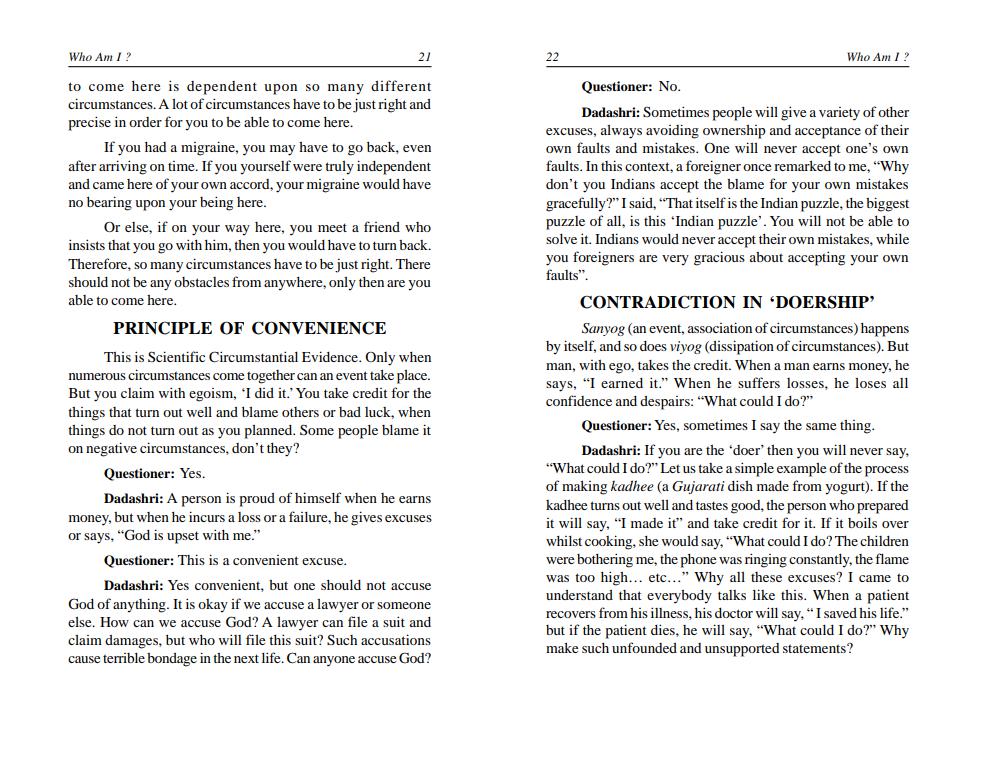________________
Who Am I?
Who Am I?
to come here is dependent upon so many different circumstances. A lot of circumstances have to be just right and precise in order for you to be able to come here.
If you had a migraine, you may have to go back, even after arriving on time. If you yourself were truly independent and came here of your own accord, your migraine would have no bearing upon your being here.
Or else, if on your way here, you meet a friend who insists that you go with him, then you would have to turn back. Therefore, so many circumstances have to be just right. There should not be any obstacles from anywhere, only then are you able to come here.
PRINCIPLE OF CONVENIENCE
This is Scientific Circumstantial Evidence. Only when numerous circumstances come together can an event take place. But you claim with egoism, 'I did it.' You take credit for the things that turn out well and blame others or bad luck, when things do not turn out as you planned. Some people blame it on negative circumstances, don't they?
Questioner: Yes.
Dadashri: A person is proud of himself when he earns money, but when he incurs a loss or a failure, he gives excuses or says, "God is upset with me."
Questioner: This is a convenient excuse.
Dadashri: Yes convenient, but one should not accuse God of anything. It is okay if we accuse a lawyer or someone else. How can we accuse God? A lawyer can file a suit and claim damages, but who will file this suit? Such accusations cause terrible bondage in the next life. Can anyone accuse God?
Questioner: No.
Dadashri: Sometimes people will give a variety of other excuses, always avoiding ownership and acceptance of their own faults and mistakes. One will never accept one's own faults. In this context, a foreigner once remarked to me, "Why don't you Indians accept the blame for your own mistakes gracefully?" I said, “That itself is the Indian puzzle, the biggest puzzle of all, is this 'Indian puzzle'. You will not be able to solve it. Indians would never accept their own mistakes, while you foreigners are very gracious about accepting your own faults".
CONTRADICTION IN 'DOERSHIP
Sanyog (an event, association of circumstances) happens by itself, and so does viyog (dissipation of circumstances). But man, with ego, takes the credit. When a man earns money, he says, “I earned it." When he suffers losses, he loses all confidence and despairs: "What could I do?"
Questioner: Yes, sometimes I say the same thing.
Dadashri: If you are the 'doer' then you will never say, "What could I do?" Let us take a simple example of the process of making kadhee (a Gujarati dish made from yogurt). If the kadhee turns out well and tastes good, the person who prepared it will say, "I made it" and take credit for it. If it boils over whilst cooking, she would say, "What could I do? The children were bothering me, the phone was ringing constantly, the flame was too high... etc..." Why all these excuses? I came to understand that everybody talks like this. When a patient recovers from his illness, his doctor will say, "I saved his life." but if the patient dies, he will say, "What could I do?" Why make such unfounded and unsupported statements?




